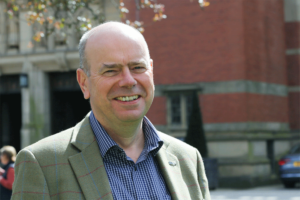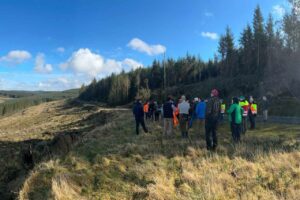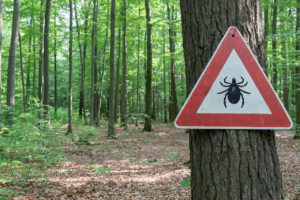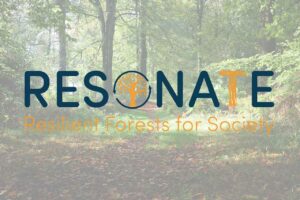ProArb catches up with our President, David Edwards FICFor, to find out about his ambitions for the Institute.

At the Trees, People and the Built Environment 3 Conference in April, David Edwards FICFor was elected as the successor to David Henderson-Howat FICFor, who stood down after two years at the helm. David is the District Manager for Wales and the Marches at Tilhill Forestry, and his experience of commercial forestry and landscaping includes ten years working in utility arboriculture on railways and powerlines.
David was elected Vice President in 2015, and has held a number of other positions at the Institute – as examiner, finance officer, Welsh Regional Group chairman, and member of both the ICF Council and the Professional and Educational Standards Committee; he has also represented the Institute and wider sector externally.
ProArb asked David whether this experience will be useful in his new role, and how he has found his first couple of months in the job.
“I think the experience has absolutely got to be a help. I was Vice President for two years previously, so I knew what was expected.
“We are yet to have a full meeting of council – that first meeting will be in September – but I will now be chairing these meetings, whereas before I was a participant. A lot of things that are going on are a continuation of my predecessor’s presidency.”
What made David run for the role in the first place, and what would he like to achieve?
“The fundamental reason for running was that I wanted to put something back into the sector. For me, the best way to do this is to get heavily involved with the Institute, he explains.
“I would like to advance the Institute and continue to improve on what it has already achieved. I’m keen on strengthening the role of the individual regions and also on providing CPD training, because I think that’s important to our members. It’s vital to listen to the members, because at the end of the day it’s their Institute and we need to be supplying what they want.
“I think another topic that is coming to the fore is ‘earned recognition’, which is where being recognised as a professional means you can be regulated with a lighter touch, or sign off your own work. That’s something else I would like us to take a look at, as it could be useful for grants and woodland creation, felling licences and other things like that.”
With over 1,700 members, the Institute is currently at its highest point in its history, but David is not going to stop there:
“Underlying everything is a continual drive to increase membership. We’re at record numbers now and are looking to increase that further.”
How does he plan on achieving that?
“It’s about engaging with individuals and groups, and being able to promote the value of being a Chartered Forester or Chartered Arboriculturist. Increasing numbers is a big part of our Member Services Director Stuart Glen’s role. He does a lot of work in terms of engaging with groups, companies and individuals, encouraging people to progress through the examination process.”
The Institute is also organising the 2017 National Tree Officers Conference, alongside the London Tree Officers Association and the Municipal Tree Officers Association. The conference will be held on 8 November in Telford.
This article first appeared in the Issue 7, Volume 4, July 2017 issue of ProArb. It is reproduced by kind permission of ProArb.





